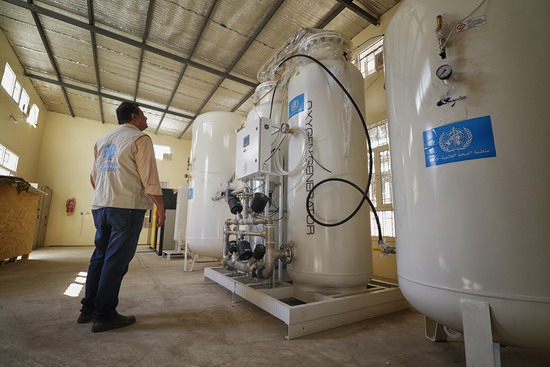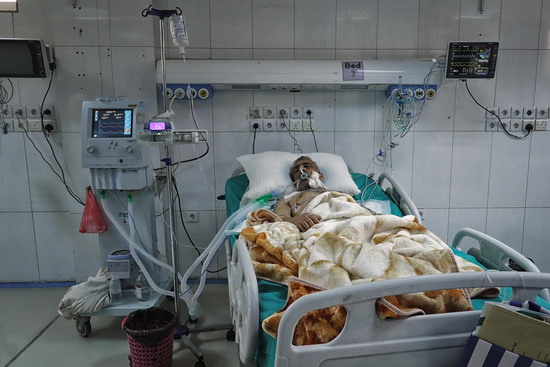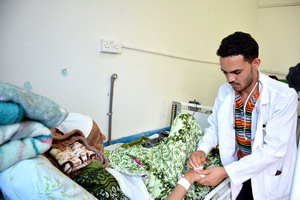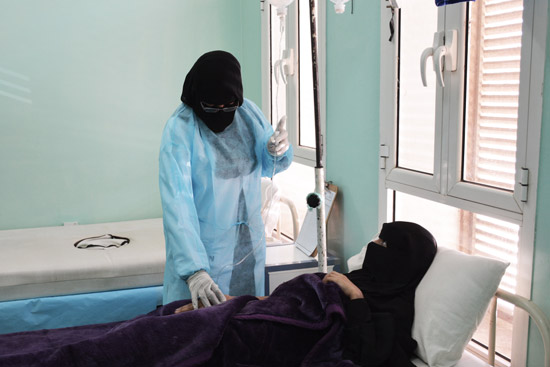WHO supports emergency medical care in Al Thawra Hospital, Sana’a, Yemen
 Each oxygen station has the capacity to fill 200 oxygen cylinders per day, helping to fill the gap of the inpatient and intensive care units in Al Thawra Hospital
Each oxygen station has the capacity to fill 200 oxygen cylinders per day, helping to fill the gap of the inpatient and intensive care units in Al Thawra Hospital
To support the functionality of Al Thawra Hospital’s emergency sections, WHO has installed an oxygen station in the facility, and equipped the intensive care unit with medical equipment.
2 July 2019, Sana’a, Yemen – Mohammed Abdullah, 13, sits in the intensive care unit of Al Thawra Hospital, the biggest referral hospital in Yemen’s capital Sana’a. “He was feeling well a few days ago, but all of a sudden, he felt pain in his chest and back and started vomiting vigorously,” says his mother.
Mohamed was rushed to a private hospital near his home, but was given medications that did not help. As his condition deteriorated, he was brought to Al Thawra Hospital, where he was diagnosed with Guillain-Barre Syndrome, a rare disorder in which the body's immune system attacks the nerves and causes numbness, weakness and pain in the feet hands and limbs.
In the bed next to Mohammed sits Maryam Ahmed, an elderly woman suffering from renal tubular acidosis, a disease that occurs when the kidneys fail to excrete acids into the urine, causing a person's blood to remain too acidic. “I’m dying,” she says with despair. A nurse reassures her that she will be cared for.
The intensive care unit of Al Thawra Hospital, where patients like Mohamed and Maryam are diagnosed and treated, was supported by WHO in response to the growing demand. The hospital receives almost 2500 patients every day from many governorates across the country. WHO support includes the provision of 11 beds for the intensive care unit, central washing machines and 350-litre sterilization machines.
 Patient in Al Thawra hospital receives treatment. The oxygen supply newly provided to the intensive unit where he is being treated is crucial to saving his life
Patient in Al Thawra hospital receives treatment. The oxygen supply newly provided to the intensive unit where he is being treated is crucial to saving his life
“Many cases are admitted in a critical condition and are forced to stay in the hospital for weeks. In addition to the medical equipment provided by WHO, the life-saving supply of oxygen provided through the oxygen station plays a vital role for the functionality of the intensive care unit,” says Najeeb Al Shamy, maintenance manager and organizations coordinator at the hospital.
The oxygen station project, funded by the King Salman Humanitarian Aid and Relief Centre and United Arab Emirates, includes a total of 11 oxygen stations that have been distributed to 11 hospitals in 11 governorates, supporting inpatient and intensive care.
WHO’s support to Al Thawra Hospital is part of a larger response plan that covers main hospitals and health facilities across the country through the provision of medical supplies, equipment, and health staff incentives. Seventy-three per cent (73%) of all hospitals in Yemen are able to keep their doors open through support from WHO through the King Salman Humanitarian Aid and Relief Centre and United Arab Emirates, providing access to essential health services to 9.3 million people across the country.
Donations from Saudi Arabia and United Arab Emirates provide access to health care for millions in Yemen
27 May 2019, Aden/Sana’a — The World Health Organization (WHO) expressed its gratitude to Saudi Arabia and United Arab Emirates for a grant of US$ 20 million, which will support ongoing efforts to stop the spread of cholera in Yemen.
“This support is crucial for stopping cholera transmission in the most affected communities, and to build the capacity to rapidly detect and respond to future outbreaks,” said Altaf Musani, WHO Representative in Yemen.
Yemen has been grappling with cholera outbreaks since the end of 2016, with the ongoing crisis in the country wreaking havoc on the ability to provide an adequate response. With a health system on the verge of collapse, the spread of the waterborne disease has been exacerbated in a country where 17.8 million people lack access to safe water and sanitation services.
The US$ 20 million received will ensure the scale-up of essential response activities in 147 high-risk districts, including increasing the number of diarrhoeal treatment centres, conducting campaigns for oral cholera vaccination, rolling out water, sanitation and hygiene activities in health care facilities, building the capacity of health workers, and promoting positive health-seeking and protective behaviours.
Overall, Saudi Arabia and United Arab Emirates have provided US$ 145.6 million in funding since 2018. Thanks to this support, in the first quarter of 2019, 2 million women received emergency reproductive health services and 25 primary health care facilities reopened in remote areas populated by internally displaced people, providing health care access to almost 50 000 people. In addition, 18 million people have been vaccinated against cholera, diphtheria, measles, polio and rubella in 2018/2019.
Government of Japan support to WHO response in Yemen
 In 2019, donations from Japan will continue to allow WHO to scale up its capacity-building activities for national health care personnel24 April 2019 – Contributions from the Government of Japan have been crucial to WHO’s health response in Yemen. Between 2016 and 2019, the Government of Japan generously supported WHO’s humanitarian response with over US$ 11 million, allowing WHO to reach over 824 000 people with essential healthcare services and ensure the continuation of life-saving programmes.
In 2019, donations from Japan will continue to allow WHO to scale up its capacity-building activities for national health care personnel24 April 2019 – Contributions from the Government of Japan have been crucial to WHO’s health response in Yemen. Between 2016 and 2019, the Government of Japan generously supported WHO’s humanitarian response with over US$ 11 million, allowing WHO to reach over 824 000 people with essential healthcare services and ensure the continuation of life-saving programmes.
In 2019, donations from Japan will continue to allow WHO to scale up its capacity-building actives for national health care personnel. These activities will target thousands of health professionals across the country, building on their capacity to deliver pre-hospital care.
“Health care workers are one of the most critical components to successful health care delivery. The conflict resulted in a massive exodus, with tens of thousands of health care personnel fleeing for their safety. Those left behind require training to ensure that they are able to handle overwhelming numbers of patients and in order to deliver quality care to the people,” said Altaf Musani, WHO Representative in Yemen.
This hospital network of trained healthcare workers is responsible for emergency medical care within Aden governorate, in addition to tertiary level care focused on patients who have sustained traumatic injuries from the conflict. In addition, hygiene and sanitation supplies will be procured and delivered to hospitals in support of infection, prevention and control protocols. Trained staff will deliver pre-hospital care services, medical supplies and medicines for trauma care to these hospitals, benefitting up to 1.8 million people living in the communities closest to these national public hospitals.
WHO’s partnership with the Government of Japan will also enable WHO to improve the quality of trauma care response, ensuring access to essential health care services at primary health care and referral levels for affected communities, especially those closest to the frontlines.
WHO renews its gratitude to the People of Japan for their continued efforts in alleviating the suffering of hundreds of thousands of people across Yemen.
Note to editors
More than 4 years of sustained conflict has left almost 20 million people in need of adequate access to healthcare and over 24 million people in need of some form of humanitarian or protection assistance — a stark 10% increase since 2018.
In February of this year, donors pledged $2.6 billion for humanitarian action in Yemen, and while these pledges are encouraging, nearly four months into the year the Humanitarian Response Plan for 2019 remains only 10% funded—80% less than what was received at this time last year.
Related link
Government of Japan provides new funding for essential health care services in Yemen
March 2018
Two years since world's largest outbreak of acute watery diarrhoea and cholera, Yemen witnessing another sharp increase in reported cases with number of deaths continuing to increase
 Photo: WHO/Sadeq Al-Wesabi
Photo: WHO/Sadeq Al-Wesabi
From Geert Cappelaere, UNICEF Regional Director in the Middle East and North Africa and Dr Ahmed Al Mandhari, WHO Regional Director for the Eastern Mediterranean
Muscat/Amman/Cairo, 26 March 2019 – “In Yemen, since the beginning of the year until 17 March, nearly 109 000 cases of severe acute watery diarrhoea and suspected cholera were reported with 190 total associated deaths since January. Nearly one third of the reported cases are children under the age of 5. This comes 2 years since Yemen witnessed the world's largest outbreak when more than 1 million cases were reported.
“We fear that the number of suspected cholera cases will continue to increase with the early arrival of the rainy season and as basic services, including lifesaving water systems and networks, have collapsed. The situation is exacerbated by the poor status of sewage disposal systems, the use of contaminated water for agriculture, unreliable electricity to store food and the displacement of families as they flee escalating violence, especially in Hudaydah and Tai’z.
“Our teams in Yemen are working day and night with a wide network of local partners to respond and stop the further spread and transmission of disease. Focusing on 147 priority districts, additional health, water, hygiene and sanitation supplies are being mobilized. Rapid response teams have been deployed. A total of 413 diarrhoea treatment centres and oral rehydration centres are operational in all 147 priority districts. Partners are repairing water and sanitation systems. In the past weeks, we scaled up chlorination activities to disinfect water in 95 priority districts and provided fuel and spare parts to keep going water supply and sanitation networks. A round of oral cholera vaccine campaign reached over 400 000 people in several districts. Meanwhile, community-based awareness-raising efforts reached 600 000 people in house-to-house campaigns since early 2019 to provide families with information on hygiene practices and improve the reporting of symptoms and seeking of treatment.
“UNICEF and WHO are committed to continue scaling up the response to assist immediately the people affected and to prevent the disease from spreading further. We are doing everything possible to avoid the 2017 scenario, including the timely use of proven effective measures, including oral cholera vaccination. However, we face several challenges, including the intensification of fighting, access restrictions and bureaucratic hurdles to bring lifesaving supplies and personnel to Yemen.
“UNICEF and WHO are calling for a lifting of all restrictions on our humanitarian operations to respond to the spread of the disease and other areas. Our humanitarian teams must have full access to reach every child, every woman, every man in need of medical and other humanitarian assistance.
“Above all, we jointly reiterate the calls for the fighting to end. It is time for the 4-year long war to come to an end. If not, Yemen will continue to be trapped in a web of disease, malice and sink deeper in endless humanitarian disasters, with the most vulnerable paying the highest price.
For further information, please contact:
Inas Hamam
Mobile: +2 01000 157 385
E-mail:
Tarik Jašarević
Mobile: +41 793 676 214
E-mail:








